

CHOOSING THE LAWCAT JOURNEY
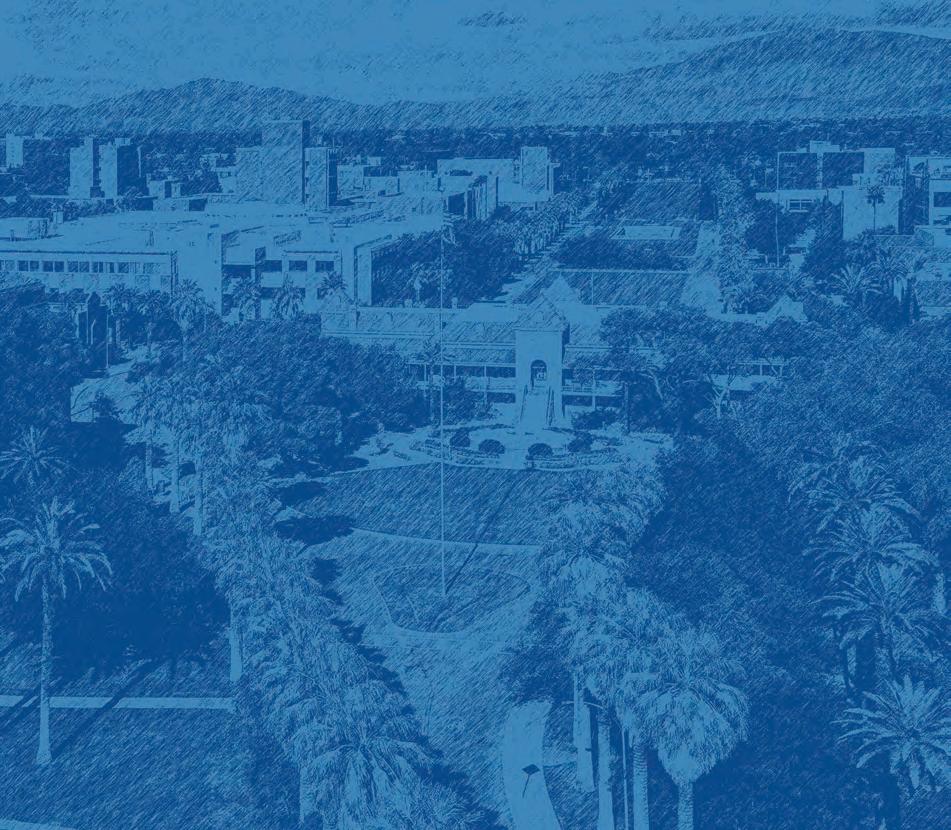
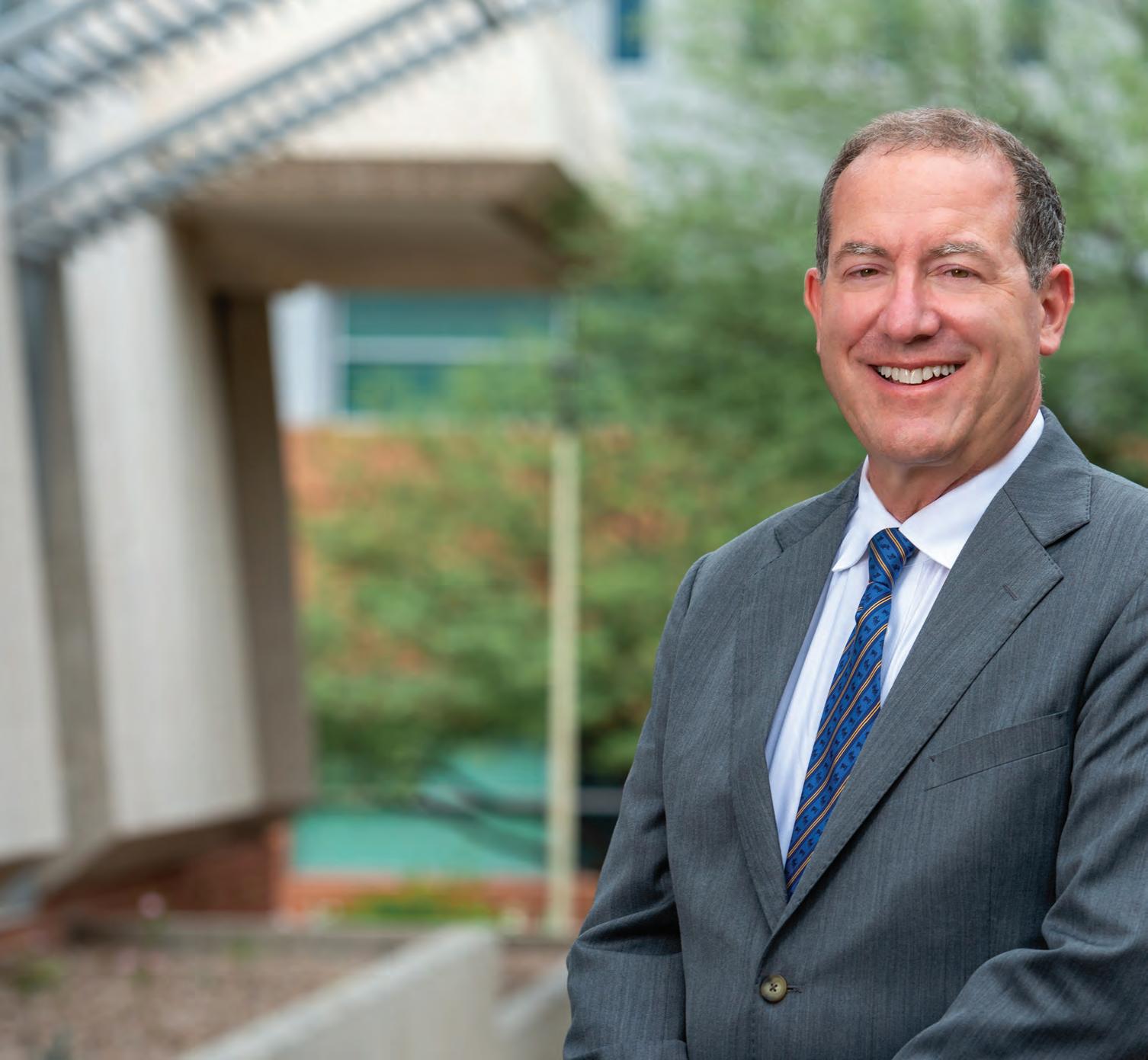

MESSAGE FROM THE DEAN
On behalf of the faculty, staff, and students at the University of Arizona James E. Rogers College of Law, I want to extend my warmest congratulations on your admission.
We are joined by the many thousands of Arizona Law alumni (and hundreds of thousands of University of Arizona alumni) who are passionate about our College.
The journey that now lies before you is one filled with excitement, challenges, and endless opportunities for growth. As you embark on this path towards becoming legal professionals, know that by choosing University of Arizona Law, you will be attending a 109-year-old and highly distinguished institution that prides itself on excellence in legal education, innovation, individualized support and community engagement.
Here at University of Arizona Law we believe in fostering a dynamic and inclusive learning environment that encourages intellectual curiosity, critical thinking and a passion for doing good. Our renowned faculty, with their expertise spanning diverse areas of public and private law, are dedicated to guiding and inspiring you throughout your academic journey. They are not only accomplished scholars and practitioners, but, by virtue of our small size, also approachable mentors who will invest in your success.
As you immerse yourself in our vibrant and tight-knit community, you will have ample opportunities to engage in meaningful conversations, collaborate with your peers, and contribute to the larger legal discourse in Arizona and beyond. Our student organizations, law journals and experiential learning programs provide avenues for you to delve deeper into your areas of interest and gain practical experience, all while making lifelong connections. Beyond the classroom, the picturesque city of Tucson awaits you with its rich cultural heritage, stunning natural landscapes, and a myriad of recreational activities. Whether you find solace in exploring the desert trails, attending local festivals, or simply enjoying the warmth of the Arizona sun, there is always something happening in the Old Pueblo.
As you prepare for the next step in your legal education, I encourage you to embrace this unique opportunity with an open mind and a strong sense of purpose. Take advantage of the resources and support available to you, seize every chance to grow personally and professionally, remain open to challenging topics and conversations, and let your passions shine through.
Please keep in mind that the road ahead may have its share of challenges but remember that you are not alone. Our dedicated team of academic advisors, career counselors and staff members are here to guide and support you every step of the way.
Once again, congratulations on your admission to University of Arizona Law. If you join us, you will find a nurturing and intellectually stimulating environment that will enable you to flourish as a legal professional. Regardless of the path you choose, we applaud your achievements thus far and look forward to the impact you will make in the legal field.
Marc L. Miller Dean & Ralph W. Bilby Professor of Law
LAW SCHOOL ROAD MAP
You’ve been admitted—so now what? This road map gives you a glimpse of your key law school milestones and what to expect for the next three years.
1L Turn in your final transcripts Arrange housing Orientation Student Bar Association picnic Clinics Fair
Small section, fall classes assigned (average class size = 23)
Classes begin Fall Break
2L Summer job Summer job Summer job
Optional 1-credit professional skills class
On-Campus Interviewing for following summer
Classes begin
3L Summer job Summer job Summer job
Optional 1-credit professional skills class
Classes begin
Register for spring classes—may pick 1 elective
Consider JD certificate possibilities Fall Break
Register for spring classes
February Bar Exam diagnostic Fall Break
Register for spring classes
PostGraduation
NOTES
SPRING SEMESTER
Final exams
Summer job interviews
Final exams
job interviews
job interviews Spring Break
Summer job interviews
Register for fall classes—choose your own schedule
Register for fall classes—choose your own schedule
job interviews Law journal write-on competitions
Classes end
Final exams
Classes end
Final exams
Final exams
Pre-Bar curriculum (if taking the February Bar Exam)
Pre-Bar curriculum (if taking the February Bar Exam)
February Bar Exam
Post-Bar curriculum (if taking the February Bar Exam)
Post-Bar curriculum (if taking the February Bar Exam)
Post-Bar curriculum (if taking the February Bar Exam)
Final exams
Receive February Bar Exam results
Graduation
YOUR FUTURE CLASSMATES
University of Arizona Law students come from all backgrounds and walks of life. Here, you’ll join a cohort of students who are driven, intellectually curious and passionate about making a difference in the world. Just like you.
*stats for incoming class fall 2024 (as of Sept. 12, 2024)
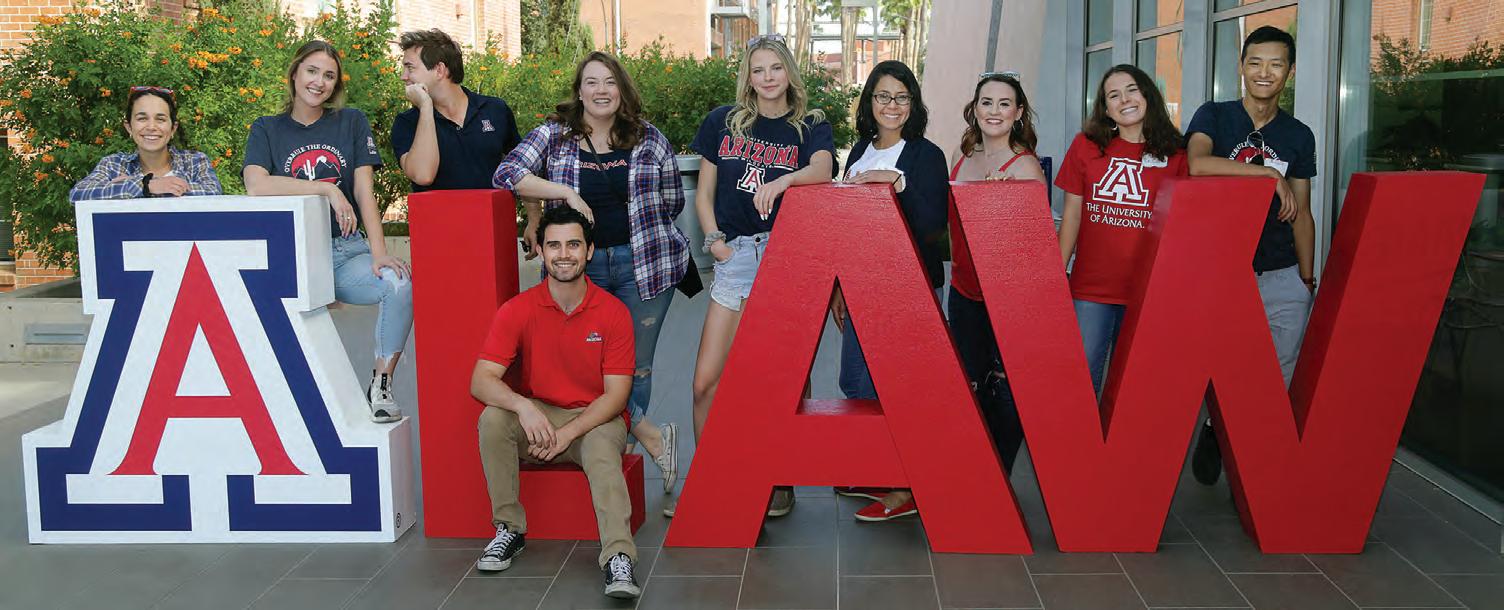
INFLUENTIAL FACULTY
Again and again, our students cite the accessibility of faculty as one of University of Arizona Law’s best features. In our JD program, a 2.6:1 studentfaculty ratio means that classroom discussions often continue into office hours or pick back up when you run into your professors around town. Faculty at University of Arizona Law are colleagues, mentors and friends to students both during your time in their classrooms and long afterwards.
Our engaged faculty are sought after practicing attorneys and legal scholars who write casebooks and legal codes, help frame civil rights issues, serve as legal experts, and advise on domestic and international matters. Their research is shaping the great debates and policy challenges of our time, from water conservation to prison overcrowding to Indigenous peoples rights. And their advocacy work in the courtroom has made tangible impacts on our legal systems.
By the numbers, it’s clear that University of Arizona Law’s full-time faculty have much to offer:
` Ranked 15th in the nation among public law schools for scholarly impact. Meaning a lot of people cite the work of our professors, including Supreme Court Justices.
` 23 hold faculty chair or professorship titles.
` 5 have been named Regents’ Professors, the most distinguished faculty level at the UA.
` 3 have been named Fulbright Scholars, in as many years.
` 1 has been appointed to the White House Council on Environmental Quality.
Complementing the teaching of our full-time faculty, several dozen part-time faculty, including distinguished practitioners, superior court justices, prominent litigators and public health professionals instruct skills classes and teach in highly specialized areas of law.
YOUR FACULTY IN ACTION
TAMMI WALKER

Walker uses psychological theory and empirical research methods to challenge the validity of beliefs that often support legal decision-making. Her policy-changing work includes the methods used by colleges and universities to adjudicate sexual misconduct cases. Walker is the recent recipient of an NSF grant to research the use of algorithms in juvenile justice systems.
BARAK ORBACH
Orbach serves as the founding director of the Business Law program at University of Arizona Law. Internationally recognized as a leading scholar of antitrust and regulation, his most recent works explore what antitrust policies are likely to protect market competition in the digital age.
ALBERTINA ANTOGNINI


As co-director of the Family and Juvenile Law Certificate Program, Antognini’s research examines how the law regulates intimate relationships and explores the distributive consequences that follow. The recent recipient of a Fulbright Scholarship, Antognini spent this past spring in Sweden where she reviewed the country’s approach to regulating non-marital relationships.
SHEFALI MILCZAREK-DESAI’S
LIFELONG PURSUIT OF JUSTICE FOR ALL
[ With liberty and justice for all. ]
Those are the words that Shefali Milczarek-Desai (’01), associate professor of law, distinguished public service scholar, and co-chair of the Bacon Immigration Law and Policy Program, recited proudly during the pledge of allegiance every morning in public-school. What is a daily order of business for some, became a galvanizing force for Desai. These six simple words would prompt a lifelong pursuit of justice for all, especially for the most disadvantaged, vulnerable and marginalized.
Desai, a class of 2001 graduate of University of Arizona Law, returned to the college after practicing law for over a decade, including in the areas of employment, education, litigation, immigration and asylum law. As a faculty member, she teaches torts, courses in employment and labor law, and seminars on emerging issues at the intersection of migration and labor. She also served as co-director of the Immigrant Justice Clinic and director of the Workers’ Rights Clinic, where she and a team of students and clinic staff upheld the rights of asylum seekers and hundreds of immigrant and migrant workers in Arizona.
In one such case, Desai took on a pro bono asylum case from the immigration law clinic concerning a young woman who was fleeing persecution and torture but who, upon turning herself in at the border, was imprisoned in the Eloy Detention Facility, where her trauma was severely exacerbated.
“I, and a wonderful, dedicated team of students, defied great odds and bonded her out of the detention facility and then went on to win her asylum case in the Tucson Immigration Court. That day will forever be seared in my memory and my heart—the pure joy on my client’s face at being given her freedom back was an incredibly fulfilling feeling,” recalls Desai.
She later teamed up with University of Arizona Professor of Practice Lisa Molomot, an award-winning filmmaker who produces and directs social justice documentaries, to make a documentary film about the case called “Soledad,” which has gone on to win numerous national film awards.
“The lesson here is to do pro bono work whenever possible, and to use your legal knowledge, which you have the privilege to acquire, for the benefit of those who otherwise would not have access to justice. It will give your legal life meaning and purpose,” says Desai.


WORDS OF WISDOM
Desai says the people are what not only made her decide to attend University of Arizona Law, but what makes this a valuable place for future law students.
“This is a place where you will be supported in all the many ways that matter most not only in your law school journeys and legal careers, but also in your professional and personal lives. Here, you will find teachers and mentors and peers and future colleagues who will see and hear you as the holistic human being you are in all your multidimensionality,” says Desai. “In return, you will be provided with the opportunity to do the same for everyone around you. That is a great responsibility and honor.”
Her hope is that her students walk away from her mentorship or after taking one of her classes and remember, “To be kind. To be kind. To be kind,” she says.
“This advice was given to me by one of my law professors who is now a mentor— former Dean and Professor Emerita Toni Massaro—and although I don’t always succeed at it, it is a goal I am always aspiring to.”
KNOWLEDGE THAT TRANSFORMS
University of Arizona Law’s curriculum is designed to cater to the varied career goals and intellectual interests of our students. We offer foundational courses that evolve with the needs of the profession and a wide array of upper-level courses that explore complex issues through diverse approaches.
First-year classes will teach you the basics of the law and legal system while our small sizes allow you to receive individualized academic support from your first-year professors, who you’ll come to know as mentors, friends and trusted advisors.
You’ll be automatically registered for your first year classes, with the exception of an elective of your choice in your second semester.
FALL
` Contracts
` Civil Procedure
` Torts
` Legal Research, Analysis & Communication
` Preparing to Practice (one-credit course)
SPRING
` Criminal Procedure
` Property
` Constitutional Law I
` Legal Research, Analysis & Communication II
` 1L Elective
Sample Electives
Antitrust Law
Bioethics & Law
Business Organization
Family Law
Federal Income Taxation
International Business
Transactions
Immigration Law
After your 1L year, you can choose from a range of courses. Take a look at this sample lineup from fall 2024 of what’s available.
Administrative Law
Advanced Criminal Procedure
Advanced Legal Research
Advanced Legal Writing
Bankruptcy & Related Issues
Basic Trial Advocacy (Lecture)
Basic Trial Advocacy (Practice)
Child & Family Law Clinic
Civil Rights Restoration Clinic
Contract Drafting
Criminal Defense Clinic
Criminal Law
Criminal Prosecution Clinic
Education Advocacy Clinic
Environmental Law
ERISA & Empoyee Benefits Law
Evidence
Family Law
Federal Border Crimes: Law, Practice & Policy
Federal Income Taxation
Federal Indian Law
Foreign, Comparative, & International Legal Research
Governance, Risk Management & Compliance
Immigration Law Clinic
Innovating Legal Services
Insurance Law
Intellectual Property Clinic
International Human Rights & Indigenous Peoples
International Human Rights Advocacy
Workshop
International Trade Law
Interviewing, Counseling & Negotiating
Land Use Regulation
Law of Gaming & Gambling
Leadership & Judgment
Leadership in Legal Innovation
Legal Practice in the Age of A.I. & Big Data
Media Law
Mediation
Mergers & Acquisitions
Native American Natural Resources
Natural Resource Use & Management Clinic
Presidential Power Seminar
Pretrial Litigation
Professional Responsibility
Professionalism in United States Legal Contexts
Public International Law
Regulation of the Modern Family
Sentencing Law
Trial Competition
Tribal Justice Clinic
University of Arizona Innocence Project
UX4Justice
Veterans Advocacy Law Clinic
DUAL DEGREES & CERTIFICATES
Students with interdisciplinary interests can further their intellectual exploration and career objectives by pursuing two degrees simultaneously through one of our dual degree programs or by strengthening a specific skill with a JD certificate.
DUAL DEGREES
` JD/PHD: Economics, Philosophy, or Psychology
` JD/MBA: Master of Business Administration
` JD/MPA: Master of Public Administration
` JD/MPH: Master of Public Health
` JD/MPS: Master of Professional Studies in Indigenous Governance
` JD/MSF: Master of Science in Finance
` JD/MS: Master of Science in Agricultural and Resource Economics
` JD/MA:
Master of Arts in American Indian Studies
Master of Arts in Latin American Studies
Master of Arts in Gender and Women’s Studies
` JD/MLIS: Master of Library and Information Science
` JD/LLM: Master of Laws
JD CERTIFICATES
` Business Litigation
` Criminal Law and Policy
` Environmental Law, Science and Policy
` Family and Juvenile Law
` Health Law
` Immigration Law & Policy
` Indigenous Peoples Law and Policy
` Intellectual Property
` International Trade & Business Law
` Mining Law
` Tax Law and Policy
` Transactional Business Law
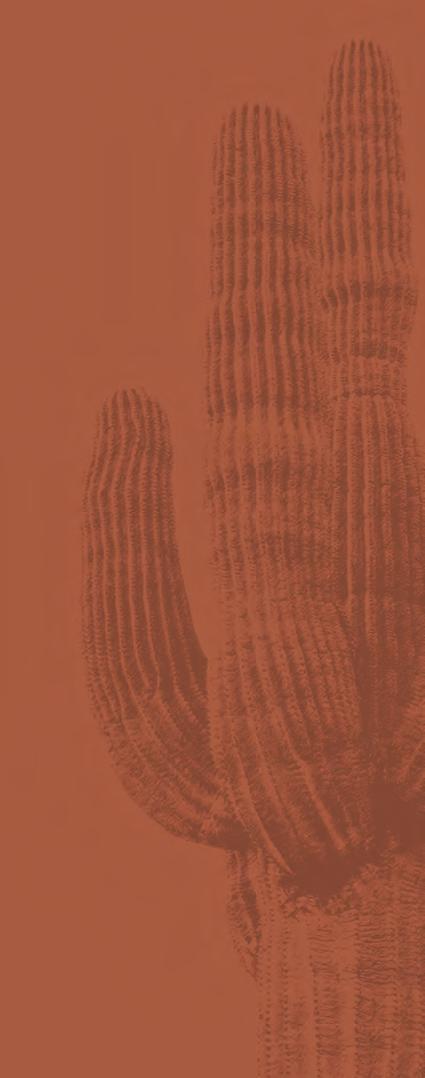

— — —
For students ready to focus their study after the first year, University of Arizona Law offers concentrated programs in key practice areas taught by leading scholars and expert practitioners.
ADVOCACY
Led by nationally respected trial experts, our advocacy program focuses on hands-on classes that ensure you are confident and equipped to rule in the courtroom.
BUSINESS LAW
Prepare for today’s complex business law practice, whether as a litigator or managing transactions and deals. You will collaborate with the UArizona Eller College of Management and connect with entrepreneurs, lawyers, scholars, scientists and more as you develop a highly competitive skill set.
CRIMINAL LAW AND POLICY
Prepare for a career in criminal prosecution, defense or policy. In addition to courses and clinics, interact weekly with distinguished guests who work in fields from criminal justice reform to forensic science.
ENVIRONMENTAL LAW, SCIENCE AND POLICY
Study alongside internationally renowned faculty and take advantage of UArizona’s vast environmental science resources as you examine the nature of environmental problems and how to solve them through law and policy.
AREAS OF STUDY —
FAMILY AND JUVENILE LAW
Receive foundational knowledge, practical skills and ethical training in working with children and families when they most need compassionate advocates. The program also operates the Child and Family Law Clinic.
GLOBAL MINING LAW
Engage on all aspects of mining law and understand law and policy issues important to mining, natural resources and energy development, all in the heart of a region rich in mining industry and home to leaders in natural resources. Courses cover a broad array of subjects, from environmental law to human rights to international trade and business.
HEALTH LAW
Be trained in one of the fastest growing and most highly regulated industries where legal expertise is in high demand. This program prepares you for work in bioethics, health insurance, medical mal-practice, regulatory science, access to care, public health and more.
IMMIGRATION LAW AND POLICY
Gain exposure to immigration issues, engage in interdisciplinary study and provide services to immigrants in Southern Arizona. Opportunities include participation in the Immigration Law Clinic and the Workers’ Rights Clinic, plus policy research, doctrinal courses, internships and more.
INDIGENOUS PEOPLES LAW AND POLICY
Train in classroom and real-world settings with faculty who are leaders in both their academic fields and as practitioners in tribal, national and international forums. The program’s unique approach to legal education in federal Indian law, tribal law and policy and Indigenous peoples human rights has made it a leader in the field for nearly three decades.
INNOVATION FOR JUSTICE
Improve access to justice with the use of design and systems thinking, technology and interdisciplinary collaboration. Design and launch real-world solutions to solve challenges in the civil legal system.
INTELLECTUAL PROPERTY LAW
Help innovators build the legal foundation they need to manage, protect and promote their ideas. In addition to patent law, trademarks and copyright, take specialized classes ranging from sports law to cyberlaw. Opportunities include a clinic, journal and the U.S. Patent and Trademark Office Law School Certification Program.
INTERNATIONAL TRADE & BUSINESS LAW
Explore how international law can address the legal challenges in today’s global world through this program that provides theoretical and practical knowledge in the international law of trade, investment, currency and financial transactions and intellectual property.
QUANTLAW
Uncover hidden social and legal problems by applying quantitative and statistical findings to legal issues. We are a leader in the emerging field of law and data, and here you will learn from and work with a cadre of nationally recognized scholars who are tackling the most difficult and interesting data problems in the world, from the use of race in traffic stops to the underlying causes or mortgage foreclosures.
REGULATORY SCIENCE
Learn how to navigate the complexities of bringing new drugs, devices and diagnostics to market through this partnership between Arizona Law and University of Arizona Health Sciences. The program includes curriculum on topics such as how the FDA is structured, bioethics, policy and the regulation of clinical trials.
TAX LAW AND POLICY
Receive an in-depth, interdisciplinary education that prepares you to become a professional with deep tax expertise and business acumen. Through a unique partnership with the UArizona Eller College of Management, you will take both law and business courses and gain insight most tax professionals are not exposed to until entering the workforce.
TECHLAW
Incorporate your STEM background with your legal education for a unique technology-and-law focus that will prepare you to play a critical role in a wide number of legal settings that require a tech-savvy lawyer, from boardroom to courtroom.
BEYOND THE CLASSROOM
True learning happens when theory meets practice, which is why we’ve infused our curriculum with experiential opportunities that emphasize writing, client interaction and other lawyering competencies, allowing you to develop practical skills that will prepare you for the challenges and intricacies you’ll face in real legal practice.
CLINICS
Real-client experience is a critical part of your legal education.
So critical that we guarantee that every student wanting a clinic placement can have one. Students in any one of our numerous clinics work under the supervision of faculty attorneys and veteran practitioners on:
` actual cases
` public policy initiatives
` community outreach and education
` other projects with significant client impact

By providing hands-on experience under dedicated mentorship, clinics offer a valuable opportunity to apply classroom learning to real-world settings. In the IP Clinic at Arizona Law, I was able to help small businesses and inventors across Arizona protect their intellectual property and achieve their business goals.
NIKI SAENZ (’25) TechLaw Fellow
Check out these clinic choices:
` Arizona Attorney General’s Office Clinic
` Child and Family Law Clinic
` Civil Rights Restoration Clinic
` Community Immigration Law Placement Clinic
` Criminal Defense Clinic
` Criminal Prosecution Clinic
` Education Advocacy Clinic
` Federal Criminal Defense Clinic
` Gender Justice Workshop
` Immigration Law Clinic
` Intellectual Property Clinic
` International Human Rights Advocacy Workshop
` Judicial Clerking Program
` Natural Resource Use and Management Clinic
` Tribal Justice Clinic
` University of Arizona Innocence Project
` Veterans’ Advocacy Clinic
` Yaqui Human Rights Project
JOURNALS
University of Arizona Law is home to four law journals and the Journal of Appellate Practice and Process, many of which are leading scholarly publications in their fields. Working on a law journal allows many students to gain highly valued skills, as they learn to research, write, and edit as well as manage the publication’s business operations.
` Arizona Law Review
` The Arizona Journal of International and Comparative Law
` The Arizona Journal of Environmental Law and Policy
` The Arizona Journal of Emerging Technologies
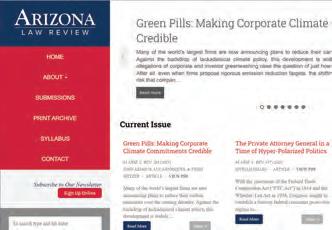
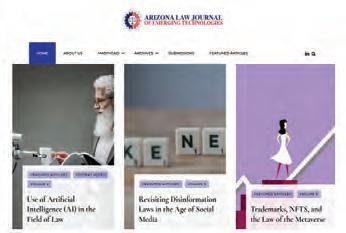
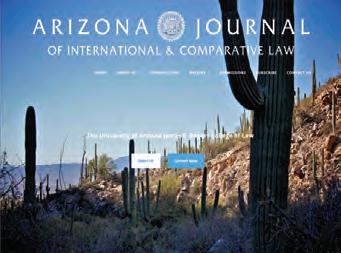
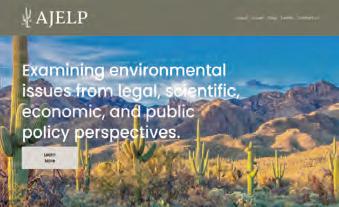
JACKSON BEDNARCZYK, 3L SENIOR ARTICLES EDITOR FOR THE ARIZONA LAW REVIEW
Why did you decide to be involved in Arizona Law Review ?
It was important to me to be involved in Arizona Law Review because I have always had a love for academic writing and scholarship. In the past I was an editor for my high school newspaper, and I completed multiple historical and sociological research projects during my undergraduate studies. I therefore saw ALR as a natural extension of my interests in scholarship. ALR gives students a great opportunity to interact with high-level and novel legal research and to improve their legal research and writing skills while doing so.
What is “Write-On” and what does the process entail?
Historically, the Write-On has involved submitting a short legal memorandum, a Bluebook quiz, and a Redbook quiz. Typically, we accept 30 students who participate in this competition. In the spring of their 1L year, interested
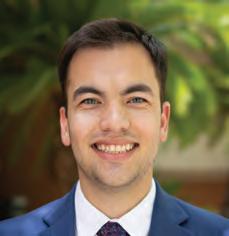
students should look out for information sessions hosted by the participating journals. At those sessions, students can learn more about the exact timing of the Write-On and what tasks the competition for that year will require.
What has been your favorite part of being a member of ALR ?
My favorite part about being a member of ALR is getting to read and work on student notes. I have so many smart and dedicated friends and colleagues here, and it has been both a pleasure and an honor to read about the legal issues they are interested in. Everyone on ALR works so hard to create the best publication possible, and that makes it both a rewarding and welcoming environment to be a part of. I can’t wait to see what everyone does after we graduate!
LEGAL SKILLS COMPETITION
Legal skills competitions are an important method of developing and practicing a wide variety of legal skills, including negotiation, trial advocacy and appellate advocacy. A variety of legal skills competitions exist, and the college, through its Legal Skills Competition Board, encourages interested and eligible students to participate in local, regional and national competitions.
COLLEGE OF LAW ESTABLISHED LEGAL SKILLS COMPETITION TEAMS
Each year, the College of Law authorizes student teams to participate in the following competitions:
` ABA National Appellate Advocacy Competition
` Jessup International Law Moot Court Competition
` National Trial Competition
` Native American Law Student Association Moot Court Competition
` Pace National Environmental Law Moot Court Competition
` Giles S. Rich IP Moot Court Competition
` Jenckes Closing Arguments Competition
INTRAMURAL LEGAL SKILLS COMPETITIONS
` Richard Grand Legal Writing Competition
` Richard Grand Closing Argument Competition
` Fegtly Moot Court Competition
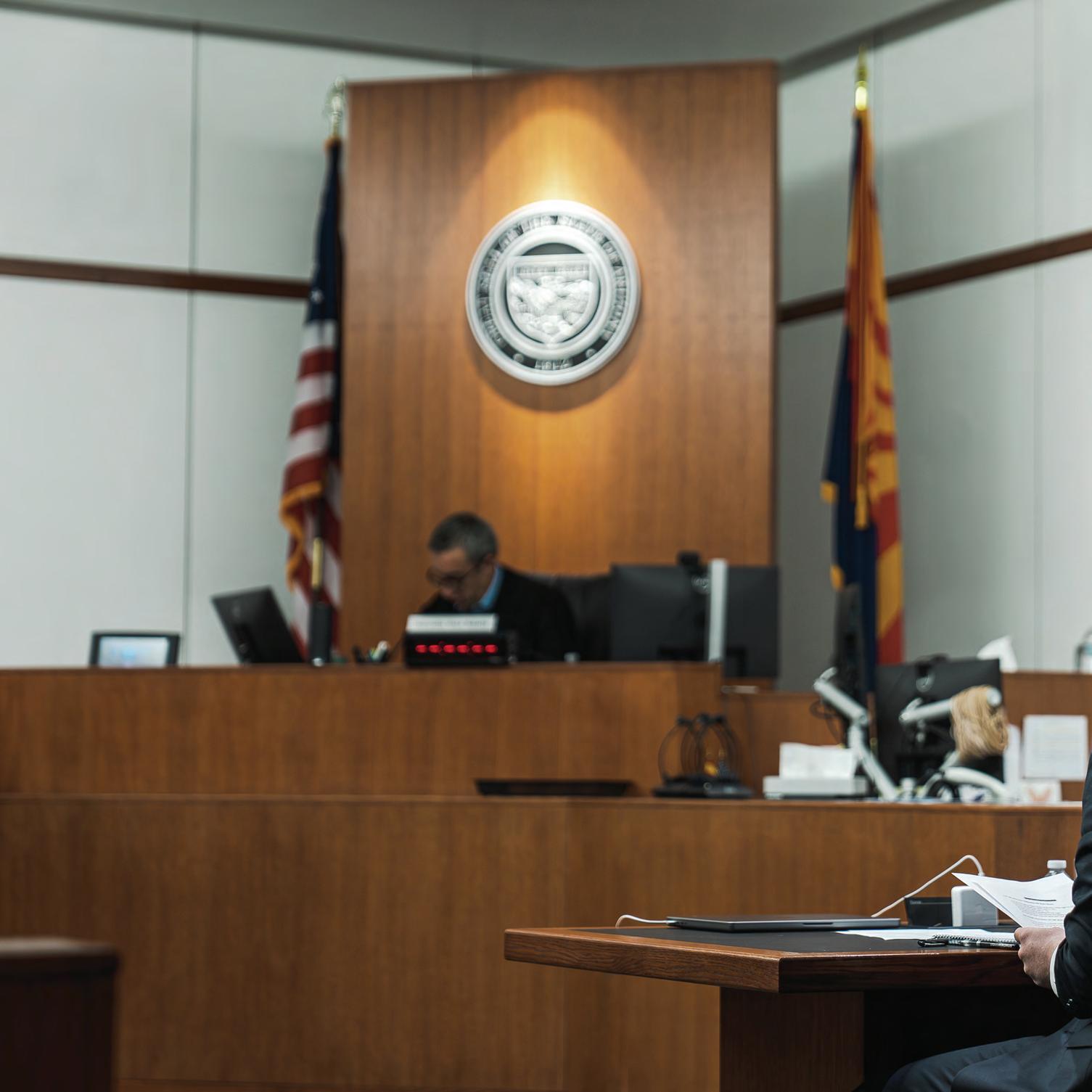
MATT LUBISICH, 3L
SAMUEL M. FEGTLY MOOT COURT COMPETITION
WINNER; ABA NATIONAL APPELLATE ADVOCACY COMPETITION

What was your experience in participating in moot court competitions?
Moot court is an incredibly rewarding experience and so much fun! Moot court is where I sharpened my legal research, writing, and oral advocacy skills. The competitions challenge you to analyze complex legal issues, craft persuasive arguments, and present in front of real judges. There is nothing more exciting than showing your developed skills in front of judges, professors and peers. I firmly believe everyone at Arizona Law should participate in moot court competitions.
Why did you want to be a part of a legal skills team/s?
Legal skills competitions provide a real sense of community with your teammates. You work with them a lot and learn so much. My teammates made me a better writer and oral advocate and have supported me throughout the competitions. Legal skills competitions are also a way for you to build strong relationships with your professors and other members of the legal community.
Would you recommend other students participate in legal skills competitions?
Every student should participate in a legal skills competition. These competitions help you succeed both during and after law school because it simulates a real oral argument in front of a judge. You make amazing friends, learn from experienced professors who have a wealth of knowledge in the law, and sharpen your skills as a future lawyer!
LEGAL WRITING ESCAPE ROOM
CHALLENGES STUDENTS’ SKILLS AND COLLABORATION
You’re in the courtroom with a small group of your classmates trying to find a key to open a lock box, the clock is ticking, and the only way to find that key is by solving a problem applying the skills and concepts that you have learned during your first semester of legal writing at University of Arizona Law, a program ranked #8 by US News and World Report.
This is the scene at the end of the fall semester for all first-year law students at University of Arizona Law. An alternative to a review session, the legal writing escape room tests students’ knowledge and understanding of the skills and concepts they have covered during their first semester in Legal Research, Analysis, and Communication (LRAC). Small groups, formed at the beginning of the year, solve a series of problems to decode clues and complete an escape room in under an hour. Students aren’t graded but the three teams with the best times get a prize and bragging rights.
“The point is for the students to have a good learning experience and recognize all the things that they have learned and consolidate them, but not for them to have a stressful, frustrating time,” explains
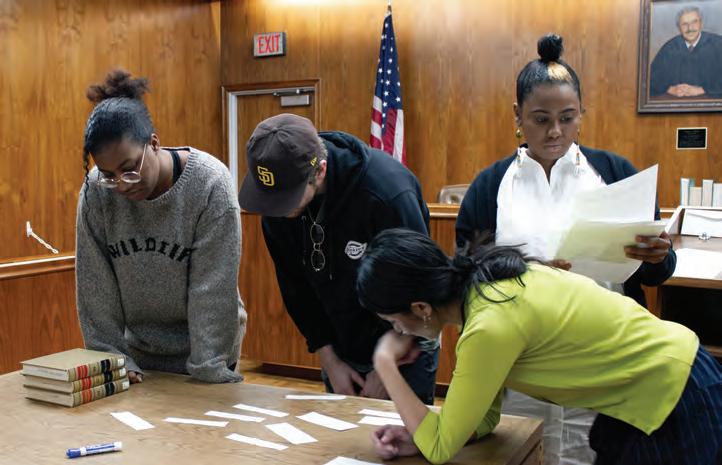
Director of Legal Writing Susan Salmon.
“Problem-solving skills are important lawyering skills.”
Salmon credits the creation of this unique review session to Associate Clinical Professor of Law Joy Herr-Cardillo, who came up with the idea after attending an escape room with a group of students as part of an auction prize. With the help of Writing Fellows, the Legal Writing team sat down and brainstormed the first review escape room in 2018.
“Students enjoy it, and even those who arrive somewhat skeptical end up thinking that it’s a really fun and challenging experience,” says Salmon.
“By participating in the escape room, some students may also realize they missed some key information or might
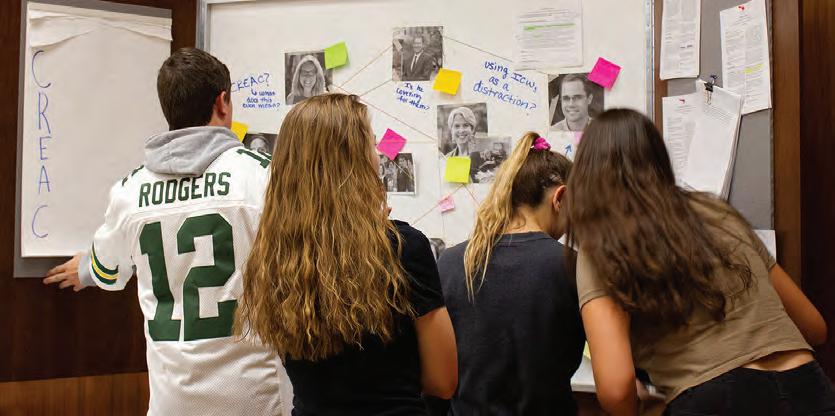
not be as knowledgeable as they could be about a particular best practice we covered during the semester, so that is also useful.”
The skills assessment is just one of the many unique ways University of Arizona Law’s legal-writing faculty use team-based learning to prepare students for life after law school.
“Problem-solving skills are important lawyering skills.”
Director
of
Legal Writing Susan Salmon
“By the end of the semester, teams have already built a working relationship, usually a successful and effective one,” says Salmon. “We have many goals in using team-based learning in the first year, but a primary motivation is that we know—both from our personal practice backgrounds and from surveys of legal employers—that lawyers often must cooperate, collaborate, and work effectively in teams. So, being able to recognize the strengths that you bring to a team and the strengths that other people bring and then harness those strengths to work effectively together to solve problems—that’s an essential lawyering skill. And the escape room really reinforces and highlights that skill.”
OUTCOMES THAT INSPIRE
A degree from University of Arizona Law opens doors to premier firms in the public and private sector. Our network of 9,000+ alumni practice in the most desirable markets nationwide and globally, excelling in various sectors such as corporate law, public interest law, government service, academia, and more. Whether you arrive at law school with a clear path in mind, or you’re not quite sure what practice area you’re interested in, you’ll find everything you need in our Career Development Office.
CLASS OF 2023 EMPLOYMENT
` 92.98% overall employment rate
` 90.35% employed in full-time, long-term bar passage-required or JD-advantage positions
national average: 84.6%
CLASS OF 2023 ILLUSTRATIVE EMPLOYERS
` Lewis Roca
` Tohono O’odham Nation Office of the Attorney General
` National Labor Relations Board
` Kirkland & Ellis LLP
` Arizona Attorney General’s Office
` 12th Judicial District Attorney’s Office
` Arizona Department of Economic Security
` The U.S. Department of Labor
` Wilson Sonsini Goodrich & Rosati
SECTOR HIGHLIGHTS JUDICIAL CLERKSHIPS
University of Arizona Law routinely outperforms the national rate of judicial clerkship placements, and not just by a small margin. The class of 2023 saw a 17.94% placement rate compared to 10.4% nationally. Since 2000, we’ve placed over 300 graduates in prestigious positions across federal, state appellate and trial courts. Our Career Development Office has staff who specialize in clerkship placement who can guide you through the unique process of securing one of these coveted positions.
JENNIFER SHIM, 2L SUMMER CLERK FOR HON. JOHN HINDERAKER

“My summer clerkship provided me with a firsthand glimpse into the behind the scenes of the judicial process: I observed judges making decisions in real-time, both in chambers and the courtroom, learned about the duties of judicial clerks, and watched various trials and hearings. It was an invaluable opportunity to apply what I learned in my 1L year to real-life issues under top-tier supervision. After observing several trials from start to finish, I gained the confidence to consider litigation as a possible practice area. Although I am primarily interested in working in the private sector, the experience piqued my interest in pursuing a federal clerkship after law school.”
number of living alumni on the bench (including retired judges)
PUBLIC SECTOR
We have a longstanding tradition of supporting public interest work. Check out the resources offered by the college for students interested in pursuing this career field.
` Our annual Sonoran Desert Public Interest/Public Sector Career Fair is devoted to government agencies, nonprofits and other public interest groups.
` The Justice Advocates Coalition provides living stipends to students working in unpaid summer positions with nonprofit law organizations.
` Our weekly Career Corner series often features public interest guest speakers, workshops and panels.
` The CareerCAT job directory posts nearly 200 public interest positions monthly.
` The Federal Work Study program, a federal financial aid program, funds student employment at nonprofit, federal or state employers.
PRIVATE SECTOR
Our CDO helps students and alumni explore career paths with top law firms and businesses around the world—from global and boutique firms to multinational corporations and tech startups. Each year, the office hosts a robust on-campus interview program which attracts 50+ private sector employers, including Kirkland & Ellis, Husch Blackwell, Polsinelli, Dickinson Wright and Snell & Wilmer, to our campus. In the 2023–24 academic year, 120 private practice positions were offered through the OCI program.
BRIDGET (KONYA) SAIDU, 3L JAC FELLOW LEGAL INTERN, COMMITTEE FOR PUBLIC COUNSEL SERVICES (CHILD AND FAMILY DIVISION)

“When I was a JAC Fellow I worked for the Committee for Public Counsel Services (Child and Family Division) in Salem, MA. I shadowed attorneys in court and conducted research. I also went along on client home visits and helped draft motions. JAC Fellowships are incredibly important because they promote the public sector when many students feel as if they can only pursue employment in the private sector. Public sectors are desperately in need of passionate attorneys, but when many of the opportunities being offered are unpaid, it can lead people to consider different paths. JAC provides adequate funding for those of us that are drawn to the public field but still need financial stability.”
ARJUN PURI, 2L SUMMER ASSOCIATE FOR QUARLES & BRADY LLP

“This summer, I worked for Quarles & Brady in Phoenix. The job involved working with attorneys to provide services to clients and shadowing attorneys during depositions, oral arguments in court, and other teachable legal experiences. The repetition of working on many written projects throughout the summer allowed me to hone the skills I learned throughout my first year at Arizona Law, especially legal research and legal writing. I have additionally enjoyed getting to know the attorneys and other summer associates through lunches and social events.
Take advantage of all the career office has to offer you. Our career counselors are all experts in their fields, and you can really accelerate your job search by mining their knowledge.
I was selected for the job through the OCI (on-campus interviews) process the Career Development Office runs, where employers come to campus to interview students. OCIs were an opportune way to interact with employers, both in the public and private sectors. I am grateful to the professors and faculty at Arizona Law for putting me in the position to have a rewarding experience this summer.”
BETTER BAR EXAM OPTIONS
Study here and practice anywhere, thanks to our game-changing bar exam options.
BE PREPARED FOR BAR EXAM SUCCESS
University of Arizona Law starts preparing you for bar exam success before you even take your first class. You will have the opportunity to participate in JD-Next over the summer, a program developed right here at the college, to learn skills critical for law school. During your first semester, you will participate in P2P (Preparing to Practice) to get you on track for success, both academically and professionally. From there, you will receive individualized counseling, access to online bar exam resources, invitations to special panels and workshops, practice tests and more. When test time arrives, you’ll be ready.
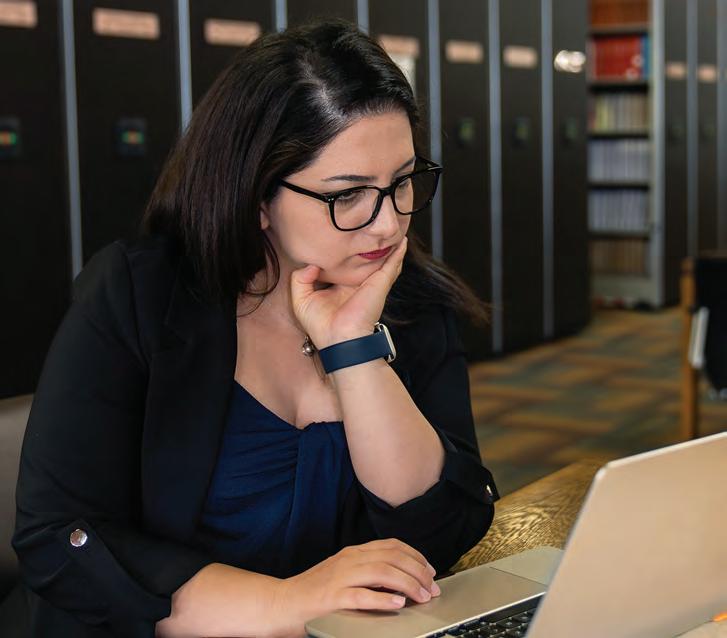
HELIX PARTNERSHIP
All University of Arizona law students benefit from our institutional partnership with Helix Bar Review, by AccessLex. Helix is the only comprehensive bar review company with a non-profit philosophy dedicated to achieving excellence in pass rates for all students. Helix team members provide valuable expertise and leadership with a learning-science based approach to bar study. Through this partnership, Arizona Law students are supported with in-school programming, including for-credit study options, test question banks, and significant discounts on your bar review course.
TAKE YOUR BAR EXAM RESULTS WITH YOU OUT OF STATE
Arizona is a Uniform Bar Exam state. Take the bar exam here and earn a portable score that can be transferred to seek admission in the other 40+ UBE jurisdictions.
PASS THE BAR BEFORE YOU GRADUATE
At University of Arizona Law, you have the option to sit for the bar exam in February of your 3L year instead of waiting until the summer. This means you get your results before graduation and are ready to enter the workforce sooner than traditional students who take the bar exam in July and must wait until October for results.
YOUR LAWCAT NETWORK
See how many LawCats are working in major markets across the U.S. Below is just a sampling of your alumni connections.


“University of Arizona Law’s alumni network has been a constant guide throughout my career. It’s not just a network; it’s a lifeline of support, mentorship and opportunity. Together, we are a testament to the power of education and community, proving that success is not a solitary journey but a collaborative venture fueled by the bonds we forge as LawCats. My path was and is enriched and enlightened by this remarkable network, and for that, I’m forever grateful.”
C. BRADLEY VYNALEK (’99)
ANN MILLER’S JOURNEY OF GROWTH AND WISDOM
Before her time as a student at University of Arizona Law Ann Miller (’99) was apprehensive—and quite frankly scared—of the idea of law school. She imagined her time would be spent in a grueling, endless slog of research and dissertations but once she started, she realized that showing up was half the battle.
“Leaning in, being diligent and deliberate, controlling what I could —these are the ‘soft’ skills that no one can teach you but are required to do well,” says Miller, who currently serves as Executive Vice President (EVP) and Chief Legal Officer at NIKE, Inc.
Now, Miller has more than 20 years of corporate governance, capital markets, mergers & acquisitions and securities law expertise. Her career began as a corporate lawyer at the law firms of Paul Hastings and Sullivan & Cromwell, before serving as General Counsel at Converse—a Nike brand. Prior to taking over as EVP and Chief Legal Officer, she served in a variety of roles at Nike including as Vice President, Corporate Secretary and Chief Ethics & Compliance Officer.
“My path was not linear and it’s unlikely yours will be either,” says Miller. “You’ve got to be willing to try new things and push yourself out of your comfort zone.”
University of Arizona Law taught her to be an active thinker, be endlessly curious and open to learning new things. Challenging her and prompting deeper thinking without always reconciling or answering the questions for her.
“All of these teachings have served me well as I am often dealing with issues that have no simple solution, where innovative and creative thinking are at a premium and really listening is critical to solving challenging situations,” says Miller.
As a law student, Miller served on Arizona Law Review, was a member of the Order of the Coif and fondly remembers her time in Dean Emerita Toni Massaro’s Civil Procedure and Constitutional Law class.
“Dean Massaro communicated ideas with clarity and depth, delivered with a wicked sense of humor and always in a thoughtful manner,” says Miller. “Not only did she teach me the fundamentals of law, but also how to touch the heart to teach the mind.”
If given the chance to do anything different during her time at University of Arizona Law, Miller says she would be more deliberate in selecting courses that would help her develop a stronger idea around her post-graduation path and to be more comfortable with not knowing it all.
“In the real world, you’re expected to try and find answers on your own, however, no one wants to see anyone struggle. I would have saved myself countless hours and alleviated a lot of stress had I embraced reaching out for help,” she says.
Miller says that although future lawyers will need to constantly refine their digital literacy to be able to communicate and collaborate with your business and clients, the fundamentals should continue to be a focus throughout their legal career.
“In today’s world, technology is rapidly changing how we approach every aspect of business—legal included. And though the tools are radically different from even two years ago, the fundamentals are still there. You’ve got to be a lifelong learner, a true communicator and approach all things with an increased level of emotional intelligence.”
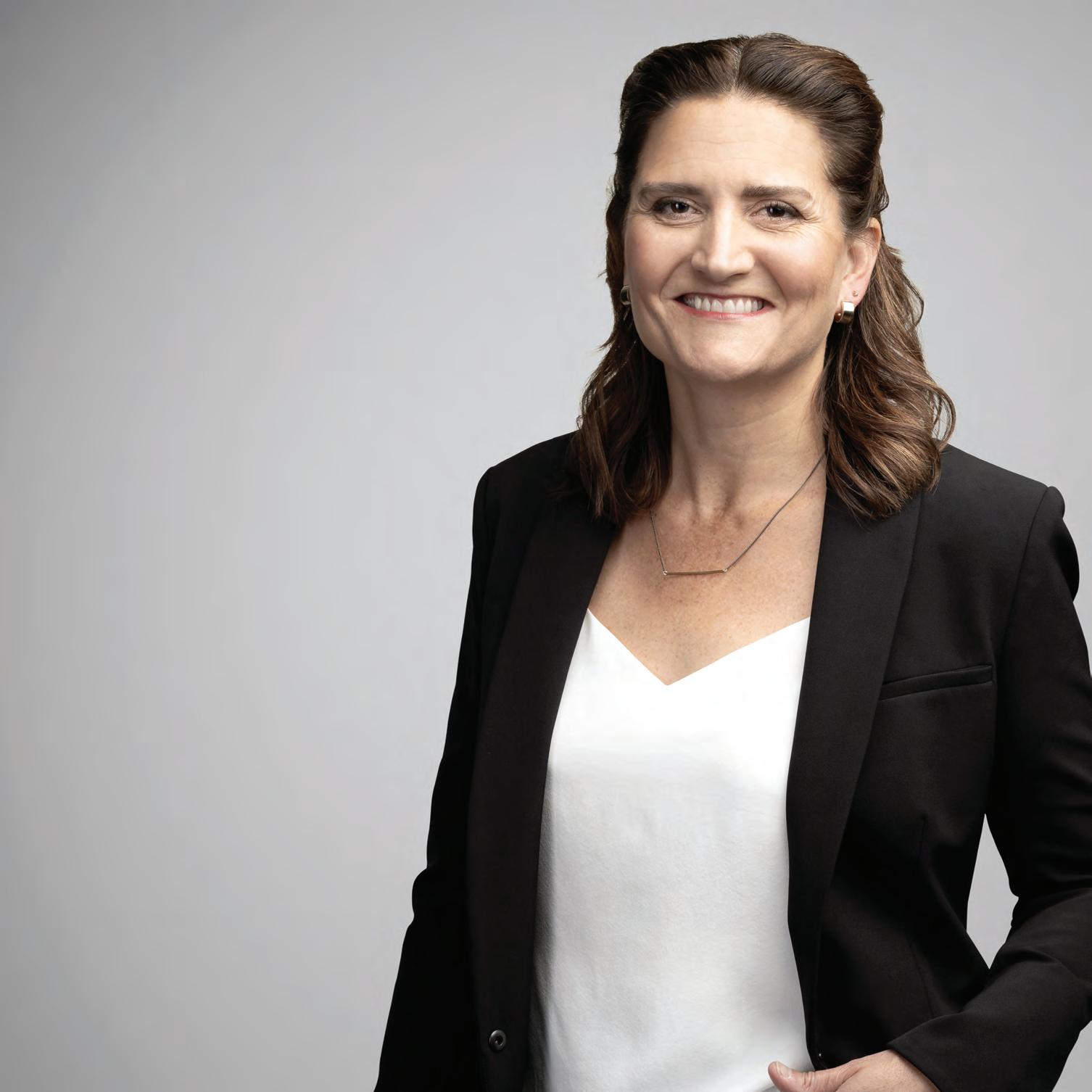
“YOU’VE GOT TO BE WILLING TO TRY NEW THINGS AND PUSH YOURSELF OUT OF YOUR COMFORT ZONE.”
ANN MILLER (’99)
COMMUNITY THAT CARES
The first thing you’ll notice when you step foot on campus at University of Arizona Law is the energy. At any given time during the day, you’ll find students playing ping pong and swapping notes in the courtyard, faculty offering thoughts on the early draft of an assignment in the library and prominent legal community members stopping by a student org meeting to share their career experiences. Happy students make better learners, so we take community building seriously.
ARIZONA LAW AMBASSADORS
The Ambassadors are representatives of the University of Arizona Law student body who provide an insider view into the college community. They are your go-to group for questions about life around the college, the legal profession or law school customs. For first-year students, the Ambassadors are here to share tools and strategies necessary to succeed as a law student, so don’t hesitate to connect with one of them. They’ve been in your shoes before and know exactly how to help.
FIRST CIRCUIT STUDENT SUCCESS PROGRAM
The First Circuit Student Success Program began as an effort to connect first generation students with each other, provide direct programming on legal education topics, and inspire pathways that students may not have considered. Led by dedicated student resources staff, this group acts as a resource for students new to the legal profession and offers support throughout their law school journey.
ACADEMIC SUPPORT
The College of Law offers academic support group tutoring in all substantive first-year courses. Tutors are secondand third-year students who did well in the class in prior year(s) and who are recommended by the professor teaching the class. Individual tutoring is offered on an as-needed basis. In addition, University of Arizona Law’s top-tier legal writing department provides free writing-support services and resources to students.

Elsewhere around the college, you’ll find:
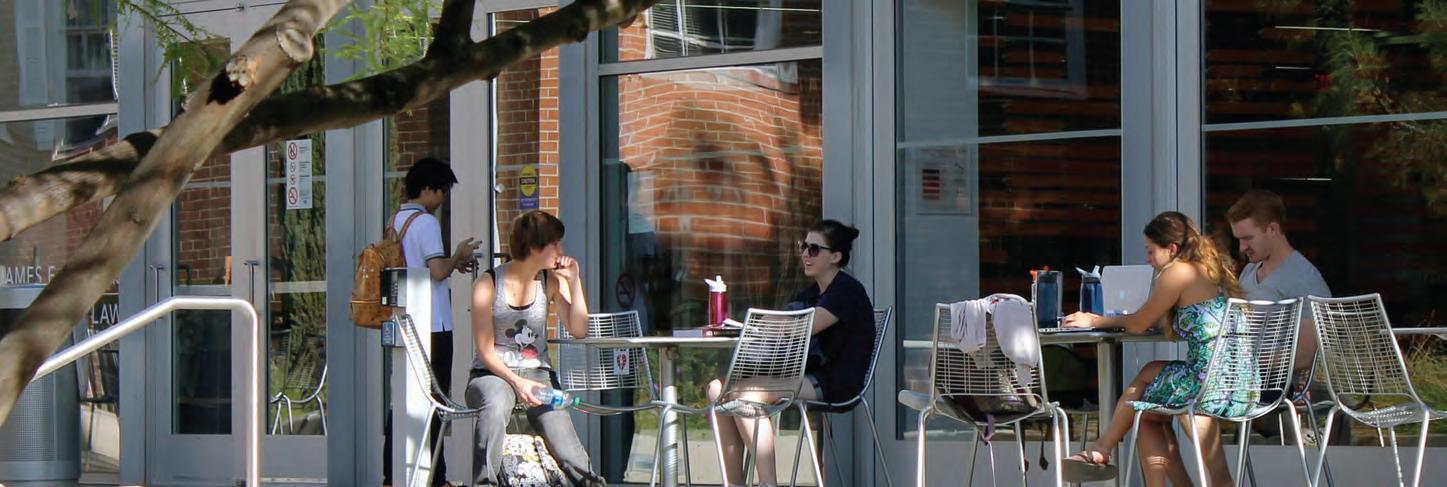
FIRST YEAR RESOURCES & ENRICHMENT (FYRE) SERIES
Designed to boost confidence, the FYRE Series provides supportive programming for first-year students throughout the fall semester. Weekly sessions include essential topics such as outlining, case briefing, study abroad opportunities, financial planning and using academic resources—valuable skills and knowledge for academic and professional success. This optional program also enables 1L students to connect with college administrators and staff dedicated to supporting their educational journey.
STUDENT ORGANIZATIONS
FOOD FOR THOUGHT
Each year, students and faculty share a meal together as part of a week-long community-building initiative known around campus as “Food for Thought.” Small groups of students sign up to dine out with a faculty member, allowing the group an informal way to get to know one another better. Conversations range in subjects from hometowns, law school experiences, career trajectories, teaching methods and life in Tucson.
The time you spend at University of Arizona Law should be immersive and multidimensional. Enrich your education and deepen your community by joining one of our many student organizations. Though clubs may vary from year to year, these groups are typically active:
American Constitution Society
Asian Pacific American Student Law Association
Black Law Students Association
Cannabis Law & Policy Association
Christian Legal Society
Environmental Law Society
Family and Juvenile Law Association
Food & Beverage Law Society
Health Law Society
If/When/How
Immigration Law Student Association
J. Reuben Clark Law Society
JAG Vanguard Society
Jewish Law Students Association
Justice Advocates Coalition
Latine Law Student Association
Law Women’s Association
LawCats LingoChats
Legal Empiricism and Discussion Society
Legal Movie Club
National Lawyers Guild
Native & Indigenous Law Students Assoc.
Pride Law
Program in Criminal Law and Policy
Society for Employment & Labor Law
South Asian Law Student Association
Student Association for International Law
Student Bar Association
The Federalist Society
Q&A WITH
STUDENT BAR ASSOCIATION
PRESIDENT MAELENE ROSALES
Name: Maelene Rosales
Hometown: San Antonio, Texas
Undergraduate: Abilene Christian University (Abilene, TX), political science with a minor in criminal justice
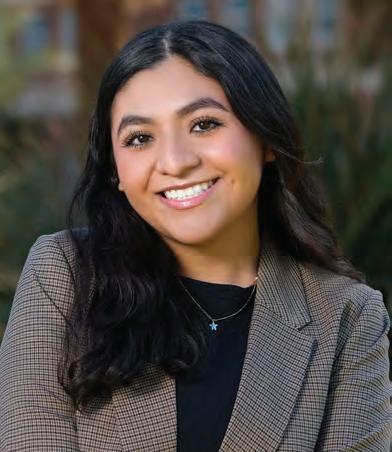
For Maelene Rosales, attending law school was a long-time goal. Now, heading into her third year at Arizona Law, she has achieved that goal and then some. In addition to attending classes and organizing student events for SBA, she also spends time enjoying Tucson’s culture and weather. Rosales was eager to help when asked to share her experience and advice with future LawCats.
What first inspired you to pursue a law degree?
I was inspired to pursue a law degree when I was 13 after some research into how I could help other Native communities protect their land against a pipeline being built through their reservation. As a young Native person in Texas, I felt powerless and wanted to know more about how I could make a difference. I then learned about environmental law and policy. Eventually that evolved into my personal pursuit of helping the Indigenous.
Why did you choose University of Arizona Law?
I chose the University of Arizona because I loved the campus and felt right at home when I visited. Every student that I encountered seemed to love the school and more importantly the community of students, professors and administrators.
What has been your favorite aspect of attending this law school?
My favorite aspect of attending this law school has been how all the professors are personable and open to questions. They are all people who take the time to know their students’ names and get to know them whenever they can. In larger schools it is very easy to go by unnoticed, but our professors deeply care about their students!
How would you describe the academic environment at the law school?
The academic environment is very special in the way that you never feel as though you are competing with your classmates but rather everyone is trying to lift each other up and accomplish the same goal together. I have studied with some of the
smartest people I have ever met and the entire time all they do is try to make sure that everyone is on the same page and that we are working together as a team. How would you describe the sense of community among students?
The community among the students is incredible. We are a small school, so it is not very hard to know a lot of people within your class because you spend so much time together on campus. Student clubs and organizations are a great way to meet new people who have similar interests to you!
What is a typical law school day like for you?
I normally get to campus around 8 a.m. and just sit in the courtyard before class to review my notes for the day. I then go to my classes and during the lunch
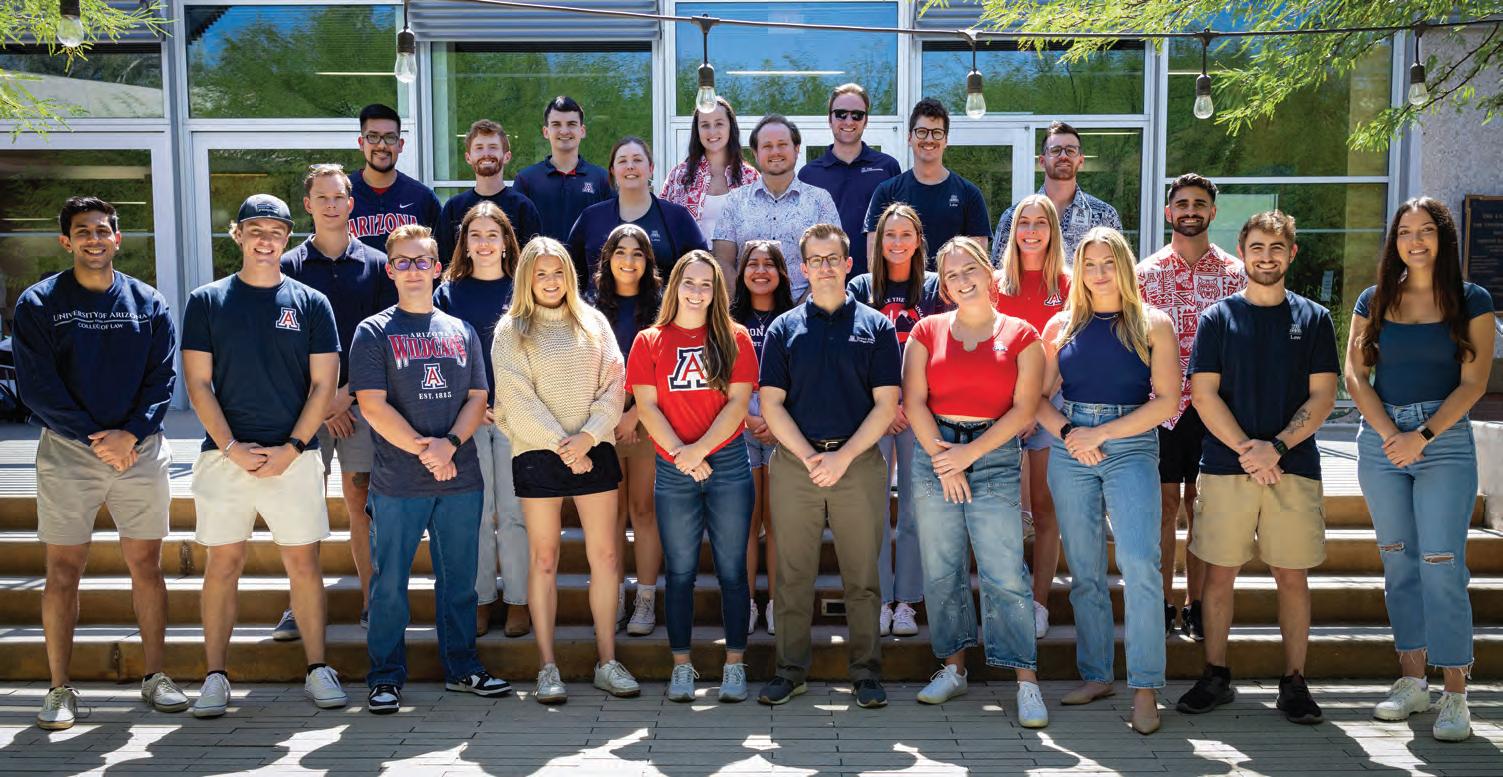
hour I attend a lunch-hour event that is normally held by a club that I am involved in, or I am in a meeting for the Student Bar Association. After I continue my classes for the afternoon and wrap up my day of school or hang out with some friends by playing sand volleyball on the main campus.
What do you think everyone should experience as an Arizona Law student?
Personally, I think that SBA’s Trivia Nights are some of the best memories that I have made during my time at Arizona Law!
What do you think everyone should experience as an Arizona Law student?
Everyone should attend a variety of student-organization events, including
those that encourage you to step out of your comfort zone. Everyone should also attend major SBA events like the Welcome Back Picnic and Barristers’ Ball. SBA Trivia is also a cool event to display your non-legal knowledge. Attending one of the law-school courtyard concerts is a must. I would also advocate for students to work with a judge. Law-school studies are important, but exploring the sites around Tucson throughout the year is a breath of fresh air.
What do you think everyone should experience living in Tucson?
I think that everyone should experience hiking “A” Mountain while living in Tucson! It’s a quick hike that has a gorgeous view the entire time.
Being in a leadership role for the SBA isn’t all work. It can mean getting having fun plus building connections, through planning student events like picnics, trivia night and the Barristers’ Ball!
Advice for the first-year students?
Ask for help and do not be afraid to ask questions! During my first year I was very hesitant to go to office hours or ask my Fellows for clarification or advice, but I deeply regret it because every single person on this campus is rooting for you! They all want to help you succeed and do your best!
WELCOME TO YOUR NEW FAVORITE CITY
Tucson is a diverse melting pot that’s rich in culture and big on personality. It’s a rare big city that’s a dream for outdoorsy types— or those who prefer to sit poolside. Whether you’re looking for that perfect mountain hike or a place to watch neon sunsets, or you want to check out the historic barrios, art galleries, and eclectic shops near campus via bike or streetcar, there’s always something to do.
Bring your appetite because Tucson is a foodie’s paradise. Flavors here are centuries in the making. A driving force behind Tucson being named the first American UNESCO City of Gastronomy, was the embracing of native ingredients such as tepary beans,
chiltepin and prickly pear—chefs here use them creatively and boldly fuse the region’s cultural influences. If you must choose one item to try—Sonoran hot dogs are our claim to fame.
Direct flights and quick drives make Tucson a central point between some of the fastest growing markets in the region including Phoenix, Los Angeles, San Diego, Las Vegas, Dallas, Denver and Salt Lake City.
Get up to $300 to help with the cost of traveling to Tucson for a campus visit! Details in the Admit Portal.
Tucson to: by plane by car
Other common direct flights:
2h 15m
15m
From the stacks to the slopes in 40 mins: Tucson is home to five mountain ranges that offer incredible vistas and hiking. Mt. Lemmon, a favorite among Tucsonians, even has its own ski slopes which get approximately 180 inches of snow annually.
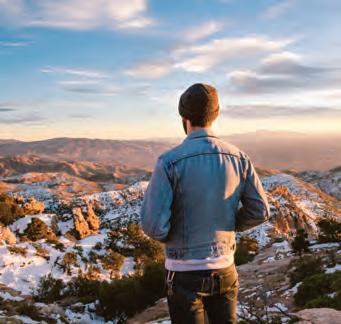


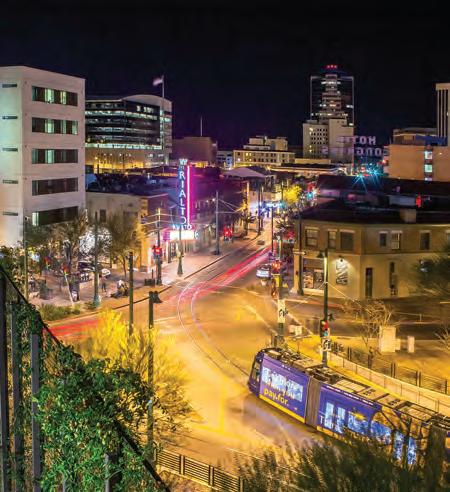
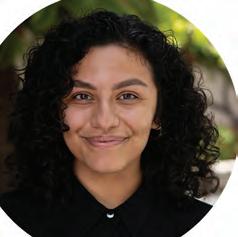
JOCELYN GARCIA, 3L TUCSON-AFICIONADO
What is your favorite place to visit in Tucson?
My favorite place to visit in Tucson is Club Congress; there is always a cool show to catch, even on weeknights!
Best thing about Tucson?
The best thing about Tucson is the history and culture. The UA occupies the homelands of the Tohono O’odham and Pascua Yaqui nations, and UA students live in the desert borderlands. The story of the Southwest is reflected in Tucson’s food, geography, and resilient community members.
Favorite Tucson annual event?
My favorite Tucson annual event is the Tucson Festival of Books! Held during the second weekend of March, the book fair takes over the entire UA mall with authors, community organizations, and food trucks.
What should every LawCat experience in Tucson?
Every LawCat should experience the food festival, Tucson Meet Yourself. The weather starts to get nicer in October, and there is so much to do! Downtown is taken over with endless food booths, cooking demonstrations, artisans, and live music.
LIFE ON CAMPUS
While life as a law student can be busy, our campus offers plenty of spaces to find solitude and inspiration.
DANIEL F. CRACCHIOLO LAW LIBRARY
The Daniel F. Cracchiolo Law Library holds nearly 300,000 print volumes and hundreds of legal databases. Housing the best U.S. law collection in the state of Arizona, the library holds unique strengths including their Indigenous Peoples, Federal Indian, and Tribal Law collections; current and historical Mexican law collection; environmental law collection; and a growing collection of legal monographs focusing on racial and social justice. Law students have 24/7 access to the library and its resources.
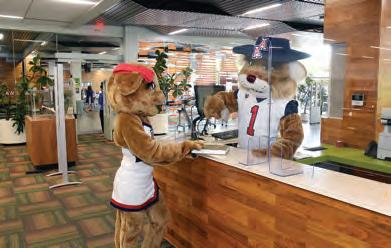
What makes this law library so special is the group of smart and talented professionals who are here to work with you and help you find your way around. Library faculty and staff are in your classrooms teaching you the intricacies of U.S. legal research, and on hand throughout each semester to help answer your questions, find what you need and jumpstart your research.
A NEW DAY IN COURT
We want to ensure our students are at ease in court long before they take their first case, and that means providing them with the proper courtroom environment right here on campus.
That’s why the college launched the “A New Day in Court” initiative in 2023 which transformed the student advocacy experience. In the fall of 2024 we’ll unveil new, state-of-the-art courtrooms, classrooms and lobby spaces that literally put litigation skills front and center in our law school.
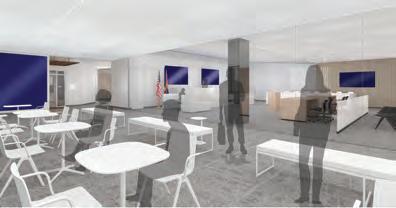
EMBEDDED IN THE UNIVERSITY OF ARIZONA
We are proudly embedded in the University of Arizona, taking full advantage of its rich resources, academic prowess and campus culture. One of the country’s top research universities, the faculty include members of esteemed national academies, Pulitzer and Nobel Prize winners, and celebrated thought leaders. Many JD students take advantage of dual-degree programs, which allow you to combine law study with a wide range of subjects: business, public health, environmental sciences, economics, gender and women’s students, finance, psychology and more. You may take graduate classes in other colleges without pursuing a degree.
Beyond the classroom, the University of Arizona is home to some of the best athletic and cultural events in the country. It won’t take long for you to realize what makes the Wildcat spirit so special.
The University of Arizona mascot is the Wildcat. When you become a student here, you become a LawCat!
With your right hand, make the iconic W-C claw to show your Wildcat pride!
Modern technology is integrated throughout the new courtroom spaces including professional presentation, recording and streaming equipment that enhances the in-court experience and allows for easy connectivity to remote participants.
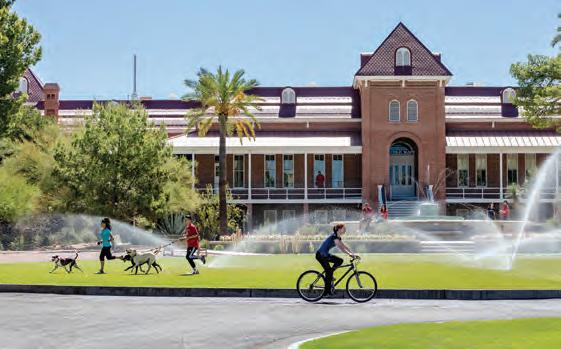
YOU CAN AFFORD A QUALITY LEGAL EDUCATION

TAKE ON OPPORTUNITY, NOT LOADS OF DEBT.
University of Arizona Law is one of the most affordable top-tier law schools in the country. Our JD non-resident tuition is significantly less expensive than resident tuition at most public law schools and vastly less expensive than most private schools.





COST
OF ATTENDANCE
Direct Expenses
Resident Tuition: $25,235
Non-resident Tuition: $29,870
Mandatory University Fees: $118
Estimated Indirect Expenses
Room and Board: $16, 300
Books and Supplies: $600
Travel and Transportation: $5,0 00
iCourse Fee: $100
Miscellaneous: $2,200
Loan Fees: TBD
Total
Residents: $49,553
Non-resident: $54,188
* www.forbes.com/advisor/education/law/law-school-cost (2023 tuition data published Apr 29, 2024)
JD FINANCIAL AID FAQS
Where do I apply for financial aid?
Apply at fafsa.ed.gov beginning Oct. 1.
The University of Arizona school code is 001083.
What does financial aid consist of?
Financial aid consists of scholarships, Federal Direct Unsubsidized Loans, and Federal Direct Grad Plus loans.
What types of federal student loans are available?
Students may be eligible for two federal loans:
` Federal Direct Unsubsidized Loans: the student does not have to demonstrate financial need to be eligible for the loan. The annual loan limit is $20,500 and cannot exceed aggregate amount of $138,500 for both undergraduate and graduate studies.
` Federal Direct PLUS Loans (Grad PLUS): loans for graduate or professional students to help pay for education expenses not covered by other financial aid. To be eligible for this loan, students cannot have adverse credit history and must meet general eligibility requirements for financial aid.
How much aid will I receive?
You will be eligible to receive enough to cover your estimated cost of attendance for nine months (2024–25 JD budget: $49,553 for residents; $54,188 for non-residents).
What is included in my cost of attendance?
Direct expenses (tuition and fees) and estimated indirect expenses (room and board, books, transportation, etc.).
When will I receive my financial aid?
Financial aid is disbursed twice per year: one week prior to the start of classes in fall and spring semesters. You can view your financial aid on UA’s online student database starting June. You can accept your aid starting the second week of July.
For more information: law.arizona.edu/finaid law-finaid@list.arizona.edu
